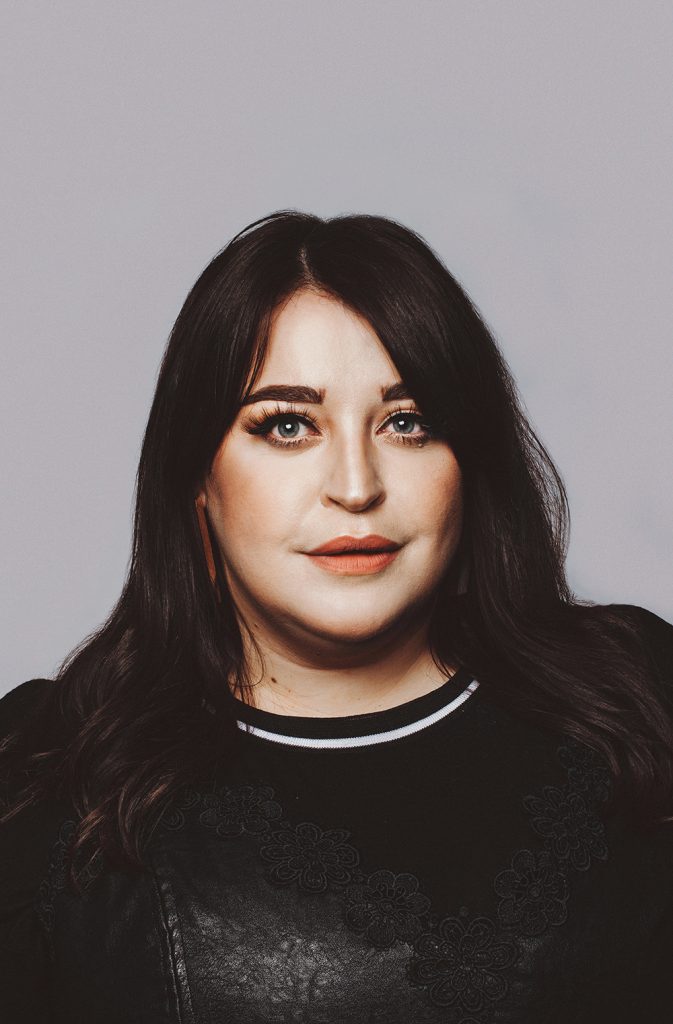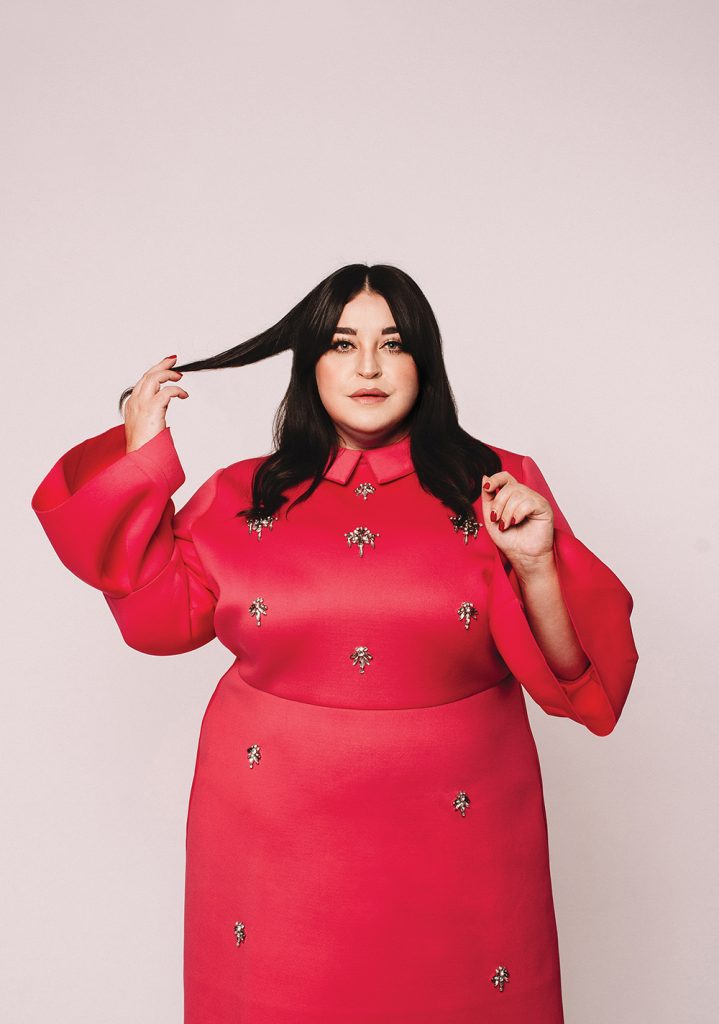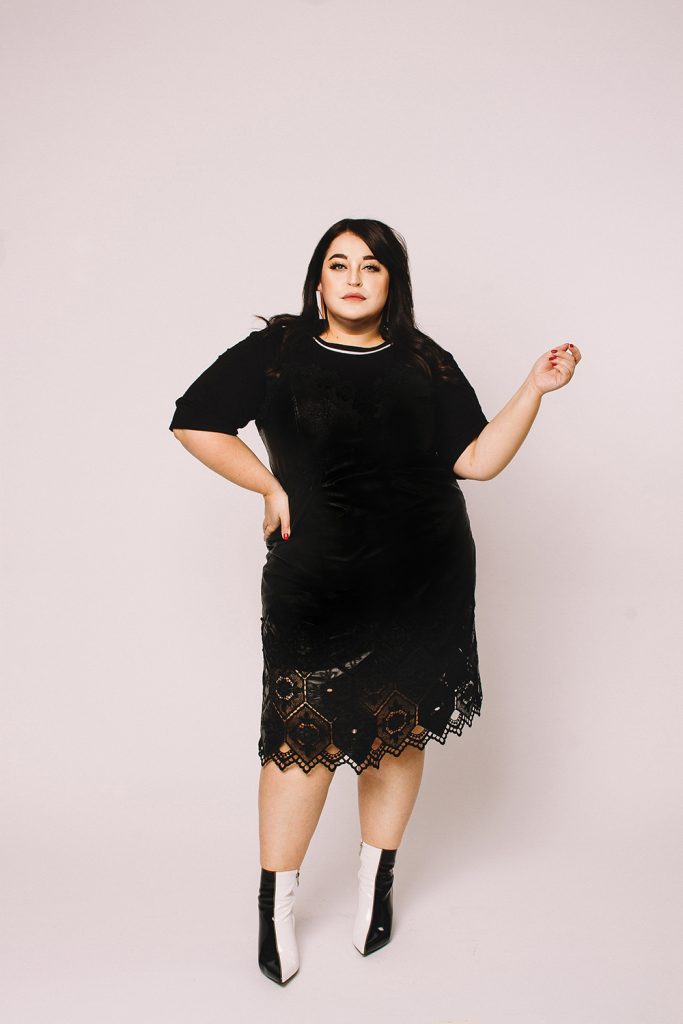The plus-size fashion blogger talks to Abbie Schofield about clothes, confidence and living with a chronic illness.
Photography: Rebecca Need-Menear

Danielle Vanier’s piercing green eyes stare straight down the camera lens as she poses with her hands on hips in front of a simple white backdrop. She looks unapologetically powerful – and so do her clothes.
“I always dress for myself and no one else.” Danielle, 32, later says.
“I would say that I mix my personal style with trend pieces. I like to combine vintage or second hand clothes with high street clothes to keep it eclectic.”
Danielle’s strong sense of personal style makes it no surprise that she studied at Chelsea College of Art and Design before going on to work for the likes of H&M and Monsoon as a print designer. However, throughout her years working in fashion and her current career as a full-time influencer, the industry hasn’t progressed as much as she’d have hoped.
“If you are plus-size, unfortunately you are very limited to where you can shop,” she explains.
“There are a lot of options online but if you’re a plus-size woman who wants to go shopping with your friends, you can’t. I would love for more British high street stores to open places for us to shop instead of shoving a plus- size section in the corner.”
Fed up with plus-size fashion being an afterthought for many brands, Danielle decided to start a blog for women who, like her, weren’t seeing themselves represented in the media.
“I wanted to try and make other plus-size women feel like they have someone to look up to, and feel inspired and encouraged to love themselves.”
Danielle now has 100,000+ Instagram followers and a successful blog where she has partnered with the likes of Nike and Primark. She was even brought on as a consultant for Marks and Spencer’s launch of their plus-size collection.
She feels proud to work with brands who embrace diversity and have a feminist message: “I love a very female- focussed, girl power-esque campaign.
I think women are subjected to a lot of shit, so it’s great when we all come together and uplift each other.
“It’s really important that brands work with a diverse selection of models or bloggers because not everyone is a white girl with an hourglass figure. We also need to see more women of colour and more visibly disabled women.”
Diversity, Danielle says, needs to be present in every aspect of a campaign.
“If a brand has a solely white team behind them, from the design to the marketing to the shop girls or boys on the floor, they have tunnel vision and there’s never going to be that diversity that we need. It needs to come at every level but most definitely the end result because that’s what the wider audience will see.”
However, there is also the issue of tokenism: brands using women of colour, plus-sized or disabled models under the veil of diversity to simply tick a box and increase sales to increasingly ‘woke’ young consumers.
“It’s very clear when a campaign is authentic.” Danielle insists.
“Hopefully as we go forward it will be more natural to see a variety of people, rather than ‘oh there’s the plus size girl, there’s the black girl’.”
Amidst the calls for diversity, the body positivity movement is also gaining momentum online, with people taking to social media to celebrate bodies in all their forms, a campaign which Danielle firmly supports.
“My angle on body positivity is to live my best life and show people that you can have fun, wear what you want and do what you want without worrying what you look like. I’m not as vocal as some other plus-size bloggers who talk about the body positivity world amazingly, but I support it by just being myself.”
Despite the glowing optimism of the body positivity movement, as a plus- size fashion blogger, Danielle is also on the receiving end of trolls, which she believes reflects society’s inherent ‘fatphobia’.
“A lot of people are livid when they see a happy, fat person enjoying themselves because people equate fatness to being unhealthy and to being unhappy – for me it doesn’t. I am attacked by trolls but when they come for me it’s water off a duck’s back. They’ve said it all to me before. As long as people have an opinion and they’re able to share it, there’s always going to be hatred.”

Danielle’s matter of fact attitude doesn’t stop her feeling disappointed that a lot of the time she is trolled by other women.
“They’re projecting their insecurities onto me because they’re not happy. But it is really difficult to walk around – and even exist – in a world where so many of the population think that you shouldn’t take up space. It can be so debilitating for people that don’t have a thick skin, but thankfully I do.
“It upsets me more when someone attacks my personality because I think ‘No! I’m nice, leave me alone!’” She laughs, but there’s a twinge of sadness behind it.
Alongside trolls, the body positivity movement is confronting ‘thin privilege’: some activists feel that slim women, who do not face the daily abuse that plus-size women do, are co-opting body-positivity to market their ‘wellness’ lifestyles.
According to Danielle, “Body positivity has become swamped with thin privilege, especially thin white women using it as a platform to put themselves out there.”
Actress and DJ Jameela Jamil was recently criticised by some for exploiting thin privilege after starting a campaign called ‘I Weigh’, which encourages women to ‘look beyond the flesh on our bones’ and ‘see how amazing we are’.
“If someone like Jameela Jamil with her thin, normative, beautiful aesthetic talks about a topic like this without acknowledging her own privilege, it’s a bit of a kick in the teeth for people who really do struggle with being viewed as disgusting by the media. She’s never going to be viewed like that.”
Danielle is of the view that body- positivity is so much more than encouraging confidence; it is about deconstructing the beauty standards imposed on men and women and tackling the discrimination that those who do not fit those standards are subject to.
Overall, Danielle does find social media empowering. She has made many good friends through blogging, and was even a bridesmaid at fellow influencer Callie Thorpe’s wedding.
“As a whole, it’s very uplifting and everyone is supportive, but it’s not
like that all the time. Sometimes there are undercurrents of bitchiness.
There is rivalry and there is a sense of entitlement with some plus-size bloggers who have been around longer. They might be jealous that you did a certain brand campaign and they didn’t, whereas if I see someone doing something that I’d like to do, I think ‘how will I start a relationship with that brand and get it next time?’”
She’s also a firm believer in being honest on social media and showing
that life isn’t perfect.
“Social media is a double-edged sword. I find that a lot of people, influencers and celebrities, put out the highlights of their life rather than the nitty gritty. I like to show both. My pictures and my content are aspirational but I prefer my Instagram Stories to be more relatable. Otherwise, viewers are misled by the illusion of a ‘perfect’ world, especially if they’re younger. But life isn’t perfect, we have great times as well as really bad times and I think it’s important we put both out there.”
Danielle suffers from a chronic illness, fibromyalgia, as well as chronic fatigue, which sometimes makes day- to-day life challenging. People with fibromyalgia experience symptoms including severe musculoskeletal pain, headaches and cognitive and memory problems.
“I cope by pacing myself – I’ve learnt that over the years. I used to force myself to do everything but then I would burn out and it would ruin me for a week. I just have to stay positive and remember that if I am having a bad day, there are going to be better days. That’s hard because I might get FOMO, especially if I’m meant to be at a work event which could help my career, but if I know it would cause more pain than I’m already in I tell my management I can’t do it.”
The effects of her illness don’t stop at the physical: “I don’t just suffer with the pain, I suffer with all the worry and anxiety that comes along with it so it can be quite a minefield.”

Whilst the nature of her freelance career now means that she can decide when to rest, her lifestyle wasn’t always so accommodating to her body’s needs.
“I’m very fortunate that I can stay at home when I’m struggling or I can pay for taxis to get around instead of public transport. When I worked 9-5, I was becoming more and more unwell and no one knew what was wrong with me. I had to get up at 6am every day, some days I was throwing up, some days I literally couldn’t move my fingers. I was getting into trouble because I wasn’t able to go to work. So, I really feel for people who reach out to me and ask me how I cope with it, especially when they say they have a really physical job as something like a nurse. My heart goes out to them.”
Danielle avoided talking about her fibromyalgia online until recently.
“I’m very open and graphic and I’ll talk about anything,” she says, “but before, I didn’t want people to look at me and the first thing they think of is ‘chronic pain’. As time went on and I realised I could use my platform to help other people with my condition feel like they’re not alone, I thought ‘I need to do this’.”
Despite beginning to speak about her illness on her blog, Danielle’s content still mainly revolves around fashion. The way she struts around the studio after each outfit change and moves with such ease in front of the camera proves her love of expressing herself through clothes and the confidence that comes with it.
“I am so happy with the opportunities that my blog has given me but I’d really like to use my creativity more. I would love to have my own brand of clothing – from sizes zero to a million! But the best thing is being able to connect with all my followers. It’s amazing when they write to me and tell me that something I’ve done or worn or said has made them feel good about themselves.”
